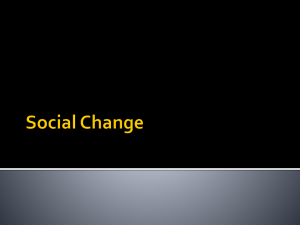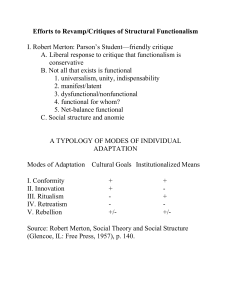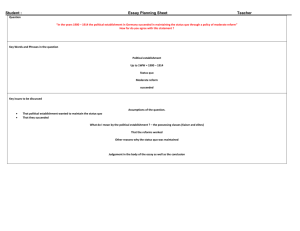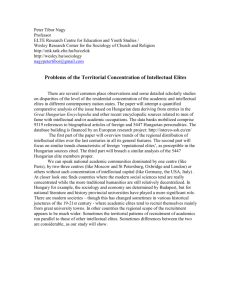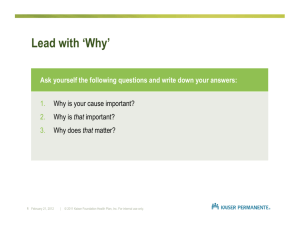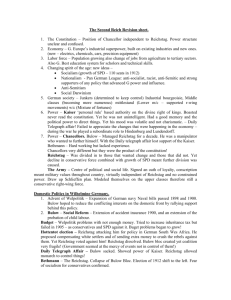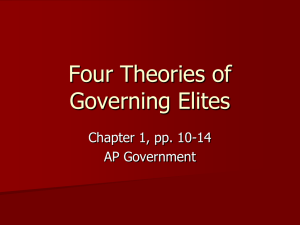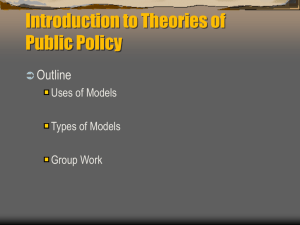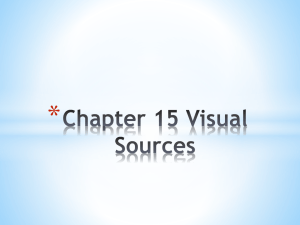Power in the Second Reich rested in the hands of the traditional elites
advertisement
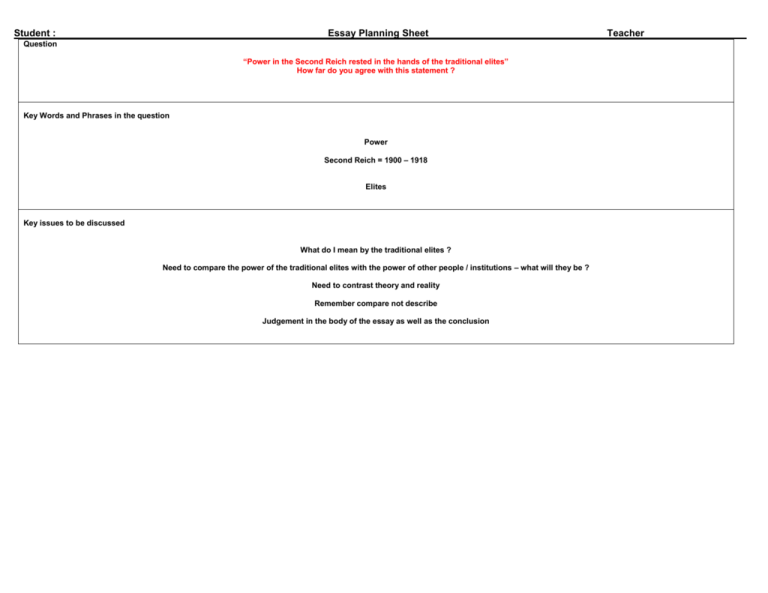
Student : Essay Planning Sheet Question “Power in the Second Reich rested in the hands of the traditional elites” How far do you agree with this statement ? Key Words and Phrases in the question Power Second Reich = 1900 – 1918 Elites Key issues to be discussed What do I mean by the traditional elites ? Need to compare the power of the traditional elites with the power of other people / institutions – what will they be ? Need to contrast theory and reality Remember compare not describe Judgement in the body of the essay as well as the conclusion Teacher Line of Argument Point Ideas and line of argument. Content Introduction Define the key term – elites Acknowledge other powerful groups (the Kaiser and the Reichstag) 1. Elites – If one considers an elite to be a small group of people who control a disproportionate amount of power, then = Army and Navy League = The Junkers / Agriculture = Nationalist pressure groups Should all be considered elites in the Kaiserriech In theory, these elites had little power, but in reality they often showed real influence. Hans-Ulrich Wehler argues that they took Germany on the Sonderweg (special path) to “militarism…authoritarian politics and a hostility towards democracy”. Evidence that these elites had real power 2. Evidence that the power rested with Reichstag 3. Evidence that the power rested with the Kaiser The Navy – Tirpitz and the Navy League > Flottenpolitik and the Naval Laws Army - Mirabeau “Prussia is not a country with an army: it is an army with a country” > Zabern Affair and Silent Dictatorship The Agrarian League - Over 100 members of the Reichstag were also members of the Agrarian League in 1900. Influence can be seen in the 1902 Tariff Law. The German Colonial League (Weltpolitik) and the Pan German League (Mitteleuropa) were also heavily represented in the Riechstag and pressured for a more assertive foreign policy. However it is important not to overstate importance of traditional elites. Support for Weltpolitik was widespread, and Von Bulow resisted the more extreme protection demands of the Agrarian League. The Silent Dictatorship really rose in the context of the collapse of the Kaiser’s authority in the First World War. Wehler goes too far. The Reichstag appears less powerful than these elites Yes it was a national parliament with the power discuss, amend and reject govt proposals. Yes it set the defence budget and the Federal Council’s consent was required for any new law. Yes It did use these powers in 1906 to reject colonial policy and to push for social reform after the SPD gains in 1912. It did challenge the Kaiser in the 1908 Daily Telegraph affair. However, The Reichstag could be ignored by the Kaiser and the army – Zabern Affair In 1906 the Kaiser just dissolved the Reichstag when it disagreed with him. What type of Parliament could not initiate legislation / govt ministers nit accountable to it. Comparison Judgement. If one considers the 1871consitution on face value then no – the Kaiserreich was an autocracy. Rohl – the Kaiser was “at the heart of the system” – the Second Reich was “a functioning monarchy” Appointed and dismissed ministers and Chancellors – and did – 1900 / 1909 / 1917. As such, he was “his own Chancellor” and “Wilhelm alone was responsible for all the key legislation of the period” (Harden). Commander in chief of the army Controlled foreign policy. However, The Daily Telegraph Affair showed that the Kaiser could not always act in an unfettered autocratic way . Comparison Judgement. Conclusion Statement very strong - incorrect Dominant theme – Kaiserriech is well named - most power rested with Wilhelm However there was much common ground between the elites and the Kaiser > Sammlungspolitik. Teacher Guidance
